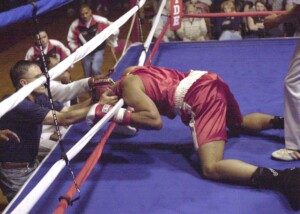
Had I been a D1 college athlete in volleyball, my mental health would’ve relished the experience; I would’ve flourished as a libero and loved every moment.
Actually, during my actual years at an NCAA Division I university, the position of libero had not yet been developed.
At 5’8, I would’ve been either a setter or outside hitter. I would’ve thrived on the “pressure.”
At 15 I entered my junior year at a new high school and joined the volleyball team as a JV player.
I stunk. But at the time, I had the insight to know that this strongly reflected 1) a bad coach, and 2) lack of experience; the other juniors had the preceding two years under their belt.
And yes, “Miss Young” was a terrible coach. A good coach doesn’t let practices go to pot just because it’s Friday.
But every Friday practice was a blow-off, in which the girls goofed off and horsed around, and she was perfectly okay with this.
I hated it. I wanted to TRAIN. I wanted the structure that Monday-Thursday practices had.
I couldn’t get into the Friday nonsense. I always felt so out of place on Fridays.
Top high school teams train hardcore and seriously five days a week.
By the end of senior year season, I was still afraid to fall to my knees for a dig.
I grew up in a home where academics – and only academics – was emphasized.
Thus, when I learned that a teammate would be spending one week at an away-camp for volleyball during the summer prior to my senior year, I didn’t even bother asking my parents if I could go too.
D1 University Volleyball Team

Freepik/viarprodesign
Oh God, I envied those girls so much. Why couldn’t I have been one of them?
Thanks to the daft coaching of Miss Young, whose full-time job had been guidance counselor for the high school, I never had a chance.
I’d always been among the first kids picked on sports teams by “captains” in grade school PE. You name it: kickball, dodgeball, relay races.
So why had I bombed in volleyball?
- Miss Young
- Volleyball is more complex than kickball, dodgeball, relay racing and “king of the mountain.”
- Parents who were 100% focused on only academic achievement.
I lifted weights at the college gym usually at the same time the university’s volleyball team trained.
Their training gymnasium was literally across the corridor from the weightlifting area.
I was never able to watch them train longer than for several moments because it was just too sorrowful.
It was like being in a bakery shop, full-on hungry, but not having the money to buy anything – if that analogy makes any sense.
I didn’t want to observe what I so desperately wanted but that I could never have: a spot on the college’s volleyball team!
- I never once believed that I stunk at volleyball because I wasn’t 5’10.
- The two best players at my high school were 5’6 and 5’5 and a half!
- In fact, there had been only two varsity girls who were taller than me.
Throughout all four years of college I often thought about its volleyball team.
I frequently imagined what it must’ve been like to be playing among cheering fans, to score points with walloped balls, to travel out of state for games – the whole kit and caboodle.
It was really a wrenching point with me, because I was never able to shake the belief that I could’ve been good enough to play on that D1 team – if only I’d had the right support system in place — like being part of a traveling volleyball club during my high school years (though nothing like that had existed back then).
- To this day, I know I would’ve thrived during the kickass training drills and grueling workouts of D1 college athletics.
- I would’ve been like “Bring it ON, Coach!” instead of crying in private over criticisms.
- I would’ve recognized that this wasn’t about being likeable or cultivating emotional relationships; it was about training like a demon to be the best athlete I could be on that court.
- After my experience with Miss Young, I would’ve totally embraced a tough, hardcore coach who showed genuine interest in developing my skills.
The next best thing to being on a D1 volleyball team was that of playing in the college’s “Power Volleyball Club.”
I Began Getting Good at Volleyball
The club met twice a week from 11 pm to 1 am. With busy class schedules, this was the only time for students to meet up.
It wasn’t long before I realized, Hey, I’m getting pretty good!
There was something about the way these pickup games, with mostly male students and a men’s height net, were structured, that led to a marked improvement in my skills over a fairly short period of time.
At some point, perhaps in my freshman year there, I suddenly found myself dropping to my knees for a dig.
I was stunned at how easy this was. I couldn’t believe I’d been scared to do it in high school. That damn coach.
There was nothing different about my college body when compared to my later high school body.
Digging from the floor, and other skills that I had picked up, had always been there.
It’s just that the coach had been too inept to realize it.
I couldn’t understand why I had never been aggressive at the net during high school, because I had damn well learned this art – at a men’s height net – through this marvelous club.
I was like, “Damn, why couldn’t I do this in high school at a shorter net? I could’ve clobbered my opponents!”
Come senior year, I felt good enough to integrate with the college team.
But I figured it was just too late to approach the coach and say, “Hi, I’m Lorra. I’ve been playing in the Power Volleyball Club since I was a freshman. I want to try out for your team.”
But I never bothered, assuming every single spot was taken, and decided I’d just have to accept the sick realization of what could’ve been, should’ve been, will never be.
Collage NON-Athletes and Mental Health
What was rancid for my mental health was this knowledge that I’d been cheated during high school, and I could never get those years back to play using the skills I had now as a college senior. You can’t go back in time, dammit!
There were no do-overs. This was a rotten bitter pill to keep swallowing day after day.
- It’s one thing when you simply lack the physicality to excel in volleyball – such as a medical condition.
- It’s a whole new ballgame when you damn well know that your poor skills were due to incompetent coaching and lack of parental support.
Yes, I began playing only in my junior year of high school. But I left out a part: My first two years of high school were at a Catholic school run by nuns.
I had tried out for its inaugarual volleyball team my sophomore year at 14.
I had not made the cut. But after only two years with the college club, I had skills that could NOT be explained by a height growth between age 14 and 18 and a little more natural muscle.
Moved to Chicago, a Volleyball Mecca, Kept Getting Better

Freepik
I was hooked on this sport. There were so many places that had pickup games.
For a long time I was averaging around 20 hours a week of pickup volleyball.
This is not an exaggeration! I had no social life, no boyfriends: plenty of time.
One of the best areas for pickup play was at Lincoln Park.
And wherever I played, the net was always at men’s height. And I got good. DAMN GOOD.
I eventually developed the skill to “stuff it,” that is, slam a spike through two pairs of men’s blocking hands.
I was quite aggressive with net play no matter how tall the opposing men were, and, to this day, can’t believe this never came to me during high school.
I became adept at setting from any location on the court, and this includes backwards.
I got very proficient at dinking, and placing third passes in empty spots, plus deftly passing rocket serves to setters.
I COULD DO PANCAKES!
In addition to all the pickup play, I attended the Chicago Volleyball Club (I believe that’s the name) every Monday evening, where we were intensely drilled.
At some point while continuing to live in Chicago, I became convinced I was good enough for an AA women’s league.
Personality First, Skills Second
But there was a huge problem: Nobody wanted me on their team.
This includes A-level and BB teams. Nobody asked me.
In pickup volleyball, it was very common for people to actively recruit players for a league. I was never the recipient of this recruitment.
I couldn’t understand why. I wondered if there was more to this agonizing reality beyond just “volleyball is very political.”
But I made myself believe it was mostly driven by “politics.”
I tried to get on teams, hung around a lot of really good players, “put myself out there” by being a continuous presence in Chicago’s volleyball community. But, no luck.
- This was very distressing because getting on an A league would’ve been the next best thing to playing D1 college volleyball.
One day I found myself at a gymnasium crammed with AA and A women and multiple nets. It was kind of like a recruiting ground for leagues.
For the first time since high school, I was at a woman’s net.
I put my hand to the top of the net and couldn’t believe how LOW it was.
I thought, “Was THIS the net I couldn’t play at to save my life in high school?! Holy shit.”
I was ready to kill at this net. But I hardly had any court time because – well, here we go again – nobody wanted me on their pickup team.
That Crushing Realization
It really was a pitchfork in my side that I could have been this good in high school.
Nothing was different about my body post-college when compared to later high school.
The variable was TRAINING and OPPORTUNITY.
One might argue that there would’ve been no way I could’ve gotten this proficient (six years in Chicago) between ninth and twelfth grade.
But first of all, I got pretty hopping good from just the Power Volleyball Club.
And second, even half the skill that I had amassed in Chicago would’ve been good enough to shine on my high school team.
I just couldn’t help repeatedly brooding about what could have and should have been!
There had only been one time when the stars had been aligned perfectly; I met a guy during doubles pickup at Lincoln Park and we connected on the court wonderfully.
He asked if I wanted to be his partner for an A-level tournament the following Sunday. I was ecstatic!
The Friday ahead of competition, during pickup at the park playing sixes, I dove and sprained my wrist. Needless to say, I had to call the guy and cancel it.
To this day, I believe this misfortune was guided by some sort of curse. That tournament may have been my “in” as far as being recruited.
I eventually moved to a major city in another state and continued with pickup games, deciding to, once and for all, ditch the fruitless effort of trying to get on a league team.
Why I Never Opted for Lower Level Team Play
One might argue that players in less competitive leagues might’ve welcomed me on their team – because it’s a common belief that less bloodthirsty athletes are not clique-minded.
But this is a myth. Every so often, I had ended up in a setting of mostly sub-B-level players.
They were actually more social than were the BB, A or even AA players. Plus, people at a more recreational level had social demands that were more difficult for me to navigate.
So whether I was surrounded by A/AA, B/BB or C/recreational, I was screwed.
Lower level players also goofed off in between plays, reminding me of the high school Friday nonsense.
I found NONE of them funny or entertaining. I just wanted to effing play the game.
Hey look, if teammates lacked technical skill, then fine. I understood; I’d once been there.
But dayum, what’s with throwing and kicking the ball into the gym’s rafters in between plays?
I couldn’t believe grown men would get off doing this. And other players, including women, would think this was funny.
This time-wasting, juvenile behavior was never seen in competitive or power play.
In fact, athletes who take this sport seriously have a name for this dopey kind of play: jungle ball.
An ongoing behavior was when someone missed a reception, everyone would make a joke about it, giggle and make dumb comments instead of promptly recalibrating and getting on with the next play.
Jungle ball was painfully boring and dull for me. F it.
Eventually I just quit this sport altogether, but will never stop wishing that I’d been on a D1 college volleyball team – pondering of all the wonderful experiences I could’ve had, should’ve had – magnificent memories that would’ve put me on a much more favorable mental health trajectory after college.
The Many Privileges of Being a D1 College Athlete
What a privileged life! Among some of these privileges are:
- Access to elite coaches, strength trainers, nutritionists and sports psychologists.
- Games televised on major networks (ESPN, CBS, etc.).
- Athletic scholarships or full or partial scholarships covering tuition, housing, meals and books.
- Some athletes receive stipends for personal expenses (known as “cost of attendance”).
- Early class course signups to accommodate training and game schedules.
- Access to academic advisors, personal tutors and athlete-only study centers.
- Special athlete dining halls with chef-prepared meals.
But what about the pressure and mental health?
Nearly ALL college students are under pressure.
This pressure can result from any number of variables — such as parents threatening to cut off tuition assistance if their child fails to maintain a 3.5 GPA.
Despite not being a D1 athlete, I still felt pressure to keep my grades up even though my own parents never made such a threat.
Many non-athletes undergo tremendous pressure leading to poor mental health during college.
Many non-athletes undergo tremendous pressure leading to poor mental health during college.
This includes those who must work full-time to pay tuition because either their parents don’t have the money or, they do have the money but won’t contribute a single dime.
I have a non-athlete niece who slaved away at a gas station and a burger place for years to put herself through college — not a single penny from her well-to-do parents.
- Such students have the added burden on their mental health of keeping a job — which may be a dirty, grinding type of job in a hostile work environment.
- Worrying about getting fired could really do a number on their mental health.
Many college students across the U.S. struggle with fitting in, making friends, adapting to dormitory life, balancing partying with studying, sticking to a rigid academic schedule, coping with being away from their family — just all sorts of dang things that can trample their mental health. And minus all those D1 athletic privileges!
On the campus I met many kinds of individuals: the physically disabled, those struggling with drug addiction or alcoholism, or from broken or abusive homes, or so needy they wore the same secondhand clothes all the time.
One student, I’ll call her Betty, used a wheelchair but was able to move her legs.
One of her hands didn’t work well, and one day I saw her in the dining hall reaching for a glass on her tray.
She tried to grab it and it fell, spilling its contents. She looked at her friends as though she were embarrassed.
I later learned that in high school, Betty had suffered a stroke; the partial paralysis, plus slight difficulty with speech, were permanent.
I’m sure Betty would’ve traded her situation in a heartbeat with any D1 athlete at the college who was struggling with embracing her privileged status and struggling to feel grateful for all the support and luck that got her there in the first place. (An example of luck is that of having access to superior coaching.)
But these “common” students got through each day like warriors and didn’t go around bawling over every unexpected nuance or unforeseen curveball.
Back in the day, college students were more self-accountable and didn’t stick the label of “trauma” on every willy nilly thing in life to get out of being accountable.
 Lorra Garrick is a former personal trainer certified by the American Council on Exercise. At Bally Total Fitness, where she was also a group fitness instructor, she trained clients of all ages for fat loss and maintaining it, muscle and strength building, fitness, and improved cardiovascular and overall health. She has a clinical diagnosis of ASD.
Lorra Garrick is a former personal trainer certified by the American Council on Exercise. At Bally Total Fitness, where she was also a group fitness instructor, she trained clients of all ages for fat loss and maintaining it, muscle and strength building, fitness, and improved cardiovascular and overall health. She has a clinical diagnosis of ASD.
.









































